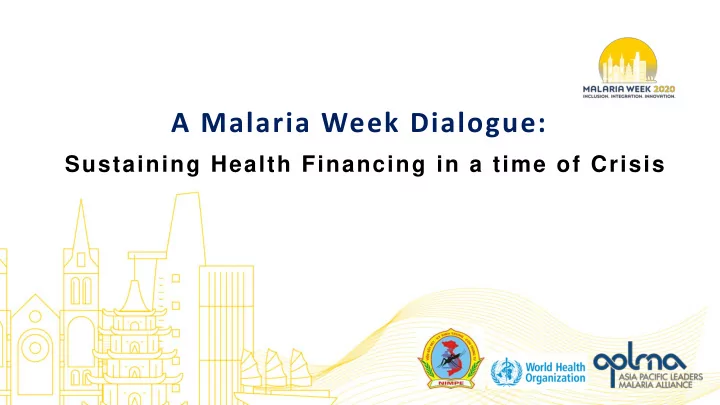

A Malaria Week Dialogue: Sustaining Health Financing in a time of Crisis
CO CHAIRS & PANELISTS Dr Indu Bhushan Dr Peter Cowley Dr Susie Perera Ms Lisa Robins CEO-Ayushman Bharat-AB-PMJAY & the Coordinator Deputy Director General, Public Health Vice Chair National Health Authority Health Policy & Service Design Unit Services II, Ministry of Health APLMA Board of Directors Government of India World Health Organization Government of Sri Lanka
OBJECTIVES Review the potential impact of COVID-19 on government revenues and budgets; • Highlight how reduced financing may jeopardize the malaria elimination goal; • Identify actions to sustain health financing for critical services. • Recommend collective priority actions to sustain financing in Asia Pacific • TheSE recommendations will feed into the Senior Officials Meeting on Friday.
“Great Lockdown” Effect on GDP Growth in Asia and Pacific
Projected impact on general government and tax revenues as share of GDP, 2017- 2020 (“Revenue Shock”) Pre-crisis levels Projected 2020 Difference Classification N Total Tax Total Tax Total Tax High-income Asia, Australia, NZ (HI) 6 28.9% 20.4% 27.3% 18.7% -1.6% -1.7% Southeast & East Asia (EA) 13 24.1% 13.1% 21.6% 11.5% -2.4% -1.6% South Asia (SA) 8 20.6% 14.3% 18.0% 12.2% -2.6% -2.4% Pacific (PA) 16 65.0% 20.2% 57.2% 18.2% -7.8% -1.6% All Asia & Pacific 43 37.4% 16.9% 33.3% 14.9% -4.1% -1.8% Low income (LIC) 29 18.4% 11.3% 18.0% 10.6% -0.4% -0.7% Lower middle income (LMI) 50 27.0% 17.2% 24.4% 15.7% -2.6% -1.6% Upper middle income (UMI) 56 31.1% 19.1% 30.0% 17.7% -1.0% -1.3% High income (HIC) 81 37.6% 22.4% 36.1% 21.4% -1.5% -1.0% All countries 216 30.4% 18.5% 28.9% 17.2% -1.5% -1.2%
Projected impact on general government expenditures as share of GDP, 2017- 2020 (“Expenditure Shock”) Classification N Pre-crisis levels Projected 2020 Difference High-income Asia, Australia, NZ (HI) 6 30.0% 38.8% 8.8% Middle-income Southeast & East Asia (EA) 13 29.0% 29.5% 0.5% South Asia (SA) 8 25.2% 26.2% 0.9% Pacific (PA) 16 59.8% 65.1% 5.3% All Asia & Pacific 43 38.3% 41.8% 3.5% Low income (LIC) 29 21.8% 24.3% 2.5% Lower middle (LMI) 50 30.2% 31.5% 1.3% Upper middle (UMI) 56 33.3% 38.0% 4.8% High income (HIC) 81 38.2% 45.7% 7.5% All countries 216 32.6% 37.0% 4.4% Source: WB/IMF staff estimates
How Do Ministries of Finance Respond to “Revenue and Expenditure Shocks”? • Government enters into “countercyclical funding” meaning it spends more when it has less revenue, but that widens the deficit • Increased deficit spending is “covered” by reserves or increased debt through the issuance of bonds or lending from state owned, multi-lateral or commercial banks • Growth in the Asia region prior to the 2008 fiscal crisis was stronger than before the COVID 19 crisis making it more difficult to access debt and enable deficit spending • Government reduces expenditures by delaying capital spending, looking for increased efficiencies and freezing government salaries • Reports from countries already show a slowing of cash flow, reduction in budgets for travel or set percent decrease across all sectors (including health)
“Safeguarding” Malaria Funding Going Forward • By being pro-active in having health budgets declared priority sectors and more specifically have malaria budgets declared a health sub-sector priority • Presenting evidence from other countries to document the resurgence of malaria when associated budgets are cut • Taking a medium term budgetary approach to malaria control and eradication • By avoiding having malaria budgets fall into the category of “frozen or reserved” line ministry expenditures that in itself is done to provide fiscal stability • To the extent possible not relying on virements (administrative transfer of budget from one part to another) or supplemental budgets to meet malaria program needs • By being realistic yet still focused on moving forward with malaria sustainability plans with partners • Getting malaria funding in front of any policy based lending or debt re-negotiation discussions
BREAKOUT SESSION MODERATORS Dr Susann Roth Sara Fewer Dr Peter Cowley Principal Knowledge Sharing and Services Co-Director, Evidence to Policy Initiative, Coordinator Specialist Global Health Group, University of Health Policy & Service Design Unit Sustainable Development and Climate California San Francisco World Health Organization Change Department Asian Development Bank Patrik Silborn Jost Wagner Head, External Relations, APLMA Founder, The Change Initiative
CHATHAM HOUSE RULES Participants are free to use information from the discussion, but is not allowed to reveal who made any comments
MAIN TOPICS • Budget outlook in represented countries • Making the case for sustained financing • If there are cuts to financing, what is the right course of action?
Recommend
More recommend